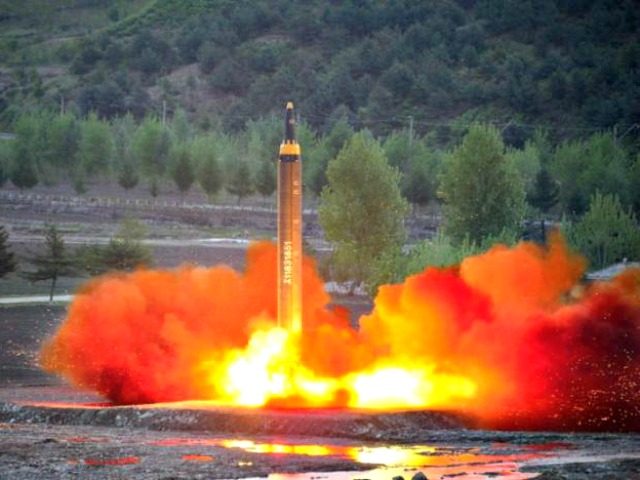WASHINGTON – The Pentagon encouraged China to step away from its ally North Korea after Pyongyang conducted an intermediate-range ballistic missile test over the weekend.
“North Korea is a liability for China, not an asset. And China will partner with us to demonstrate to North Korea that it stands alone in its pursuit of illegal weapons of mass destruction,” Pentagon spokesman Navy Capt. Jeff Davis said Monday.
“And of course we remain steadfast and ironclad in our commitment to our allies the Republic of Korea and Japan,” he added.
The U.S. has stepped up diplomatic pressure on North Korea by drawing closer to China. Beijing has so far halted coal imports from North Korea and has begun talks with the U.S. on possible new United Nations sanctions, according to Reuters.
The U.S. is also hoping Russia will increase pressure on North Korea since it is one of the few countries that has diplomatic relations with the rogue regime.
The White House issued a statement Saturday that was aimed at Moscow.
“With the missile impacting so close to Russian soil – in fact, closer to Russia than to Japan – the President cannot imagine that Russia is pleased,” White House Press Secretary Sean Spicer said.
Spicer then reissued a call for “all nations to implement far stronger sanctions against North Korea.”
Russian President Vladimir Putin responded by condemning the missile launch as “dangerous” but warning against “intimidating” Pyongyang.
“I would like to confirm that we are categorically against the expansion of the club of nuclear states, including through the Korean Peninsula,” Putin said, according to Russian news agency Sputnik. “We are against it and consider it counterproductive, damaging, dangerous.”
But he added that “intimidating” North Korea is unacceptable.
The Trump administration is hoping the pressure will bring North Korea back to the negotiating table for a peaceful solution, and the president himself has expressed willingness to talk to North Korea’s leader under the right conditions.
“You’ve heard our leaders say we continue to call on North Korea to refrain from provocative, destabilizing actions, rhetorics and to make a strategic choice to fulfill its international obligations and commitments to return to serious talks,” Davis said.
At the same time, the administration is subtly applying military pressure. It has deployed the first battery of a missile defense system to South Korea known as the Terminal High Altitude Area Defense (THAAD) system.
“This system has the ability to defeat North Korean missiles and clearly…North Korean missiles are a threat, a threat to the region and very destabilizing,” Davis said.
Davis said the U.S. recently completed the deployment of the first battery to South Korea and that the system has achieved initial operating capability.
“That’s not the full-up operational seamless capability that we want, but it is an additional ability to defeat North Korean missiles,” he said.
China has been opposed to the system’s deployment, arguing it poses a threat to its capabilities, and South Korea’s new president has also expressed concern about the system.
Davis said concern in China is “perplexing” since the system is “100 percent defensive in nature.”
“It does not have an offensive capability. It is meant to defend against North Korean missiles,” he said. “So that that should be considered a destabilizing act by others is curious and incomprehensible in my view.”
Davis contrasted North Korea’s behavior with that of the U.S. and its allies in the region:
When you’re talking about North Korea, which is flagrantly violating international resolutions against it, violating international law, developing nuclear capability, developing missile capability, and you juxtapose that against a steadfast alliance that does the same exercises we’ve done for years – it sails ships through international waters, flies airplanes in international airspace, and to somehow call us the provocative ones, I just don’t buy that.

COMMENTS
Please let us know if you're having issues with commenting.